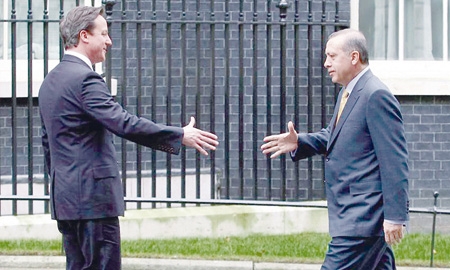For the business and political world, Turkey has for several decades represented a bastion of democracy and stability in a region often racked by violence. Indeed, this strong point has once again come into focus as the political systems in certain neighbouring countries are near toppling.
Today, Turkey sits comfortably among the top 20 economies of the world. Come 2023, when the republic celebrates its centennial, the country’s political and business leaders expect the economy to have moved into the top 10.
“Vision 2023 is a goal we believe is attainable,” says Dr Ibrahim Kalin, chief advisor to Prime Minister Recep Tayyip Erdogan. “If you look at Turkey’s rising profile over the last 10 years or so and over the successive AKP governments, it becomes very clear that Turkey has the potential and the ability to be a great power in economy, politics, foreign policy and many other areas.”
Mr Erdogan was first elected Prime Minister in 2003, two years after establishing the Justice and Development Party (AKP), which is described as the largest publicly supported political movement in Turkey. He was re-elected for a third term last month, however his party no longer enjoys parliamentary majority.
A dynamic, open and largely market-driven economy is one important feature of Mr Erdogan’s eight-year run in office. Although Turkey was not immune to the global recession in 2008-09, the economy is well on the mend, having expanded 8.9 per cent in 2010. The Economist Intelligence Unit forecasts slower growth of 6 per cent in 2011 and 4.5 per cent next year, before bouncing back to between 5 and 5.5 per cent in 2014-15.
| A BASTION OF REGIONAL STABILITY, TURKEY IS A KEY NATO ALLY AND THE UK IS A STRONG ADVOCATE OF ITS EU ACCESSION PLANS |
“The government has placed a lot of effort on revitalising the economy, especially private-sector investment,” says Deputy Prime Minister Besir Atalay. “As a state we are trying to complete certain projects, including the costly and comprehensive GAP (Southeastern Anatolia Project), which will really help the agricultural sector. We are inviting the private sector to fill in the infrastructure gap we have, which not only comprises irrigation projects, but also includes roads, for example.”
Mr Erdogan’s administration is also working tirelessly towards EU membership and towards bringing about positive change in the Middle East and the Balkans. Its strategic geo-political position in the world – namely, its location between the Middle East and Europe – means it lies at the crossroads of different cultures, ones whose friction or harmony can affect stability not only in the region but in a large part of the world.
“Every minor or major contribution we make to regional peace is also a contribution to global peace,” explains Dr Kalin. “We lead by example. If you set a good example with your foreign policy, social policy and economy, you immediately become a centre of interaction for others. This is why we believe Turkey is joining the EU: having a Muslim country as a full member will send a very positive message to the rest of the Middle East and the Arab and Muslim world.”
Turkey boasts a strong relationship with the UK, one that endures changes in political parties on both sides. Furthermore, the UK is Turkey’s strongest supporter for its EU accession.
“The relationship between Turkey and the United Kingdom is based on strong bonds of alliance, friendship and mutual trust,” says Abdullah Gül, President of Turkey.
Dr Kalin adds, “This chemistry is wonderful and helps tremendously with bilateral relations and many other areas.” Additionally Turkey and the UK have hundreds of companies doing business with each other in both countries.
Straddling the line between the West and the Muslim world, Turkey would like to share its history, culture, politics, international relations and its sense of identity and perception.
“There is a new Turkey emerging,” says Dr Kalin. “From science to education, economy and foreign policy, and even popular culture events, a new Turkey is becoming a reality. This new Turkey has a new story that needs to be heard.”

0 COMMENTS